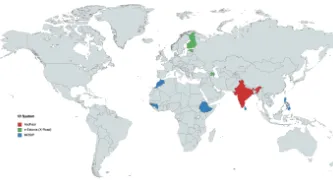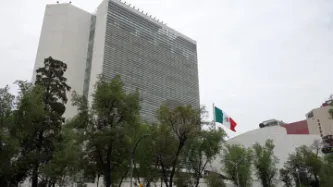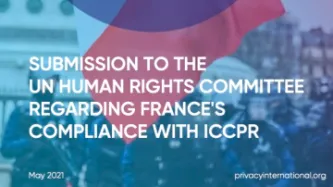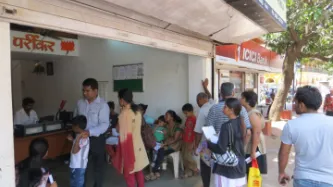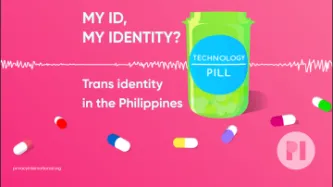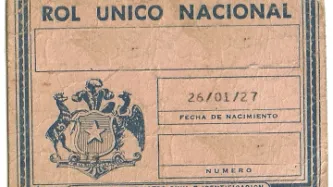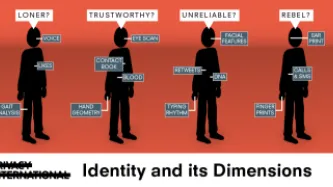Search
Content type: Video
In Kenya, if you don’t have an ID, life can be extremely difficult. But for thousands of people across the country, getting an ID can be nigh on impossible. Some Kenyan citizens can’t obtain a national ID because they are registered in the Kenyan refugee database. Often referred to as victims of double registration, their predicaments reveal a deeper problem with ID itself.
Now Haki na Sheria - a Kenyan organisation advocating for and supporting the victims of double registration - and three…
Content type: Case Study
This written piece is part of PI's wider research into the tech behind ID systems around the world. Click here to learn more.
Overview
Aadhaar (Hindi for ‘foundation’) is India’s ID programme, the largest in the world, surpassing 1 billion sign ups in just under 6 years. This programme aims to give every citizen a unique, biometrically-verifiable identification number. Each user receives a card with their number on it, which can be cross-referenced with the biometric data held in a government…
Content type: Long Read
For over 20 years with the start of the first use of ICTs in the 1990s, we have seen a digital revolution in the health sector. The Covid-19 pandemic significantly accelerated the digitalisation of the health sector, and it illustrates how fast this uptake can be and what opportunities can emerge; but also, importantly, the risks that it involves.
As we've said many times before, whilst technologies can be part of the solution to tackle some socio-economic and political challenges facing our…
Content type: Case Study
This written piece is part of PI's wider research into the tech behind ID systems around the world. Click here to learn more.
Overview
The Modular Open Source Identity Platform (MOSIP) is an open source, open standards based foundational identity platform. MOSIP is an API first platform that can be used by user organisations such as Governments to build their own foundational national ID platforms. MOSIP offers ID life-cycle management features and identity verification capabilities out of the…
Content type: Long Read
Governments around the world are increasingly making registration in national digital ID systems mandatory for populations, justifying its need on a range of issues from facilitating access to services, to national security and fighting against corruption. This is an attempt to create a "foundational identity" for an individual, or "a single source of truth" about who someone is, according to a government agency. These identity systems are run by governments, sometimes by private companies, or…
Content type: Advocacy
Some of the most vulnerable groups in Mexico are amongst the groups at risk from a draft General Population Law that creates a biometric “Unique Digital Identity Card” (CUID), argue civil society organisations. The proposed law has now reached the senate, and has raised serious concerns from civil society organisations. Led by our global partner in Mexico Red en Defensa de los Derechos Digitales (R3D), PI along with 25 organisations have signed a joint letter to the members of the senate,…
Content type: News & Analysis
After almost 20 years of presence of the Allied Forces in Afghanistan, the United States and the Taliban signed an agreement in February 2020 on the withdrawal of international forces from Afghanistan by May 2021. A few weeks before the final US troops were due to leave Afghanistan, the Taliban had already taken control of various main cities. They took over the capital, Kabul, on 15 August 2021, and on the same day the President of Afghanistan left the country.
As seen before with regime…
Content type: Advocacy
On 6 August 2021, the World Health Organisation (WHO) published its technical specifications and implementation guidance for “Digital Documentation of COVID-19 Certificates: Vaccination Status” (DDCC:VS) following months of consultations. As governments around the world are deploying their own Covid-19 certificates, guidance from the global health agency was expected to set a global approach, and one that prioritises public health. As such, we would expect the WHO to identify what these…
Content type: Examples
In January 2021, the Indian Health Ministry officially allowed Aadhaar-based authentication when creating a UHID for identification and authentication of beneficiaries for various health IT applications promoted by the Ministry. This enabled the Co-Win portal, which is used to book COVID-19 vaccination appointments, to accept Aadhaar for authentication. As per Clause 2a of Co-Win’s privacy policy, “If you choose to use Aadhaar for vaccination, you may also choose to get a Unique Health ID…
Content type: Advocacy
En mai 2021, nous avons fait une soumission pour la 132ème session du Comité des droits de l’homme qui a eu lieu entre le 28 juin 2021 et le 23 juillet 2021 en relation avec la conformité de la France avec le Pacte international relatif aux droits civils et politiques (PIDCP) avant l’adoption de la liste de points à traiter avant présentation de rapports (LoIPR).
Nous avons appelé le Comité des droits de l’homme de l’ONU à inclure dans la liste des questions au gouvernement français les points…
Content type: Advocacy
On May 2021, we made a submission for the 132nd Session of the Human Rights Committee that took place between 28 June 2021 and 23 July 2021 in relation to France’s compliance with the International Covenant on Civil and Political Rights (ICCPR) before the adoption of the List of issues prior to reporting (LoIPR).
We called the UN Human Rights Committee to include in the list of issues to the French government the following:
Emergency measures taken in response to the Covid-19 pandemic, and…
Content type: News & Analysis
This article was written by Abdías Zambrano, Public Policy Coordinator at IPANDETEC, and is adapted from a blog entry that originally appeared here.
Digital identity can be described as our digital personal data footprint, ranging from banking information and statistics to images, news we appear in and social network profiles, interactions with and in digital platforms, and information contained in private and public repositories. Our whole life is online, often leaving us with little choice…
Content type: News & Analysis
Legislation to "strengthen the integrity of UK elections and protect our democracy" through the Elections Integrity Bill was introduced to parliament this week.
This legislation will require people, for the first time in Great Britain, to show a state-issued photo ID, such as a driving license or passport, in order to exercise their right to vote, perhaps by the 2023 General Elections. The changes would affect elections in England, Scotland and Wales while voters in Northern Ireland are already…
Content type: Long Read
Social protection programmes can be broadly understood as government support for individuals to meet basic human needs, protecting citizens from the “economic risks and insecurities of life”. These policies and programmes are essential to reducing the lifelong consequences of poverty and exclusion. Programmes like cash transfers – including child grants, school meals, skills development and more – help connect families with health care, nutritious food and quality education. To ensure that…
Content type: Long Read
This piece was last updated in June 2021.
In many countries, access to social protection (such as welfare programmes or healthcare) is made conditional on producing a form of identification (“ID”). But obtaining a recognised and accurate ID is often a process riddled with discriminatory designs, bureaucracy and technical failures that prevent individuals from accessing the services they are entitled to. Even when people eventually get an ID, it might not accurately reflect who they are,…
Content type: Examples
On 2 March 2021, the Ministry of Health of Uganda unveiled its plan to immunize millions against COVID-19 starting on 10 March 2021.
The statement made by the Ministry of Health noted that "All persons eligible for vaccination will be required to provide a National Identification Card in the case of Ugandan citizens or a passport in the case of non-Ugandans".
Source: https://www.youtube.com/watch?v=asc5mQe0-3I
Publication: NTV News
Content type: Report
Privacy International has released a report summarising the result of its research into the databases and surveillance tools used by authorities across the UK’s borders, immigration, and citizenship system.
The report uses procurement, contractual, and other open-source data and aims to inform the work of civil society organisations and increase understanding of a vast yet highly opaque system upon which millions of people rely.
It also describes and maps…
Content type: Video
Links:
Our report in English
Our report in Spanish
You can listen and subscribe to the podcast where ever you normally find your podcasts:
Spotify
Apple podcasts
Google podcasts
Castbox
Overcast
Pocket Casts
Peertube
Youtube
Stitcher
And more...
Content type: Long Read
This report is available in English.
La mayoría de los documentos nacionales de identidad y demás documentos emitidos por autoridades estatales incluyen un marcador de género. Estos marcadores suelen recibir el nombre de “marcador de sexo” aunque este término no sea preciso. La presencia de dichos marcadores, especialmente en los certificados de nacimiento, promueve el énfasis de nuestra sociedad en el género como criterio de asignación de identidades, roles y responsabilidades sociales. Al…
Content type: Long Read
Este informe está disponible en español.
Most national ID or identifying documents include a gender marker. This is often known as a 'sex marker,' even though the term is inaccurate. The presence of such markers, especially on birth certificates, contribute to our society’s emphasis on gender as a criterion for assigning identities, roles and responsibilities within society. With gender being such a determining and dominant identifier, it puts it at the centre of so many arrays of our…
Content type: Long Read
Photo credit: Francisco Javier Argel
Questions of identification and ID, with their associated privacy risks, are only increasing. There are multiple dimensions to understanding the impact of ID and identification; a key one is to understand how it can exclude. This is why Privacy International is conducting research to explore this important and underreported aspect.
Read our case studies: Carolina and Iliana.
In the identity discourse, identity is often closely linked to themes of “…
Content type: News & Analysis
Photo Credit: Marion S. Trikosko
This month, the World Bank's Identity for Development (ID4D) initiative is launching its inaugural "Mission Billion Challenge", a competition designed to promote innovation in the identity space with the inaugural question: "How can digital identification systems in developing countries be designed to protect people’s privacy and provide them with greater control over their personal data?” But make no mistake: introducing "privacy by design" does…
Content type: Long Read
Image attribution: By Legaleagle86 at en.wikipedia, CC BY-SA 3.0.
In a long-anticipated judgment, the Indian Supreme Court has ruled that India's controversial identification system Aadhaar is Constitutional. They based their conclusion on notes that there are sufficient measures in place to protect data, and that it is difficult to undertake surveillance of citizens on the basis of Aadhaar.
But there is some good in this ruling. The court has demanded that the Government introduce…
Content type: Examples
In December 2017, it was revealed that the large telco Bharti Airtel made use of Aadhaar-linked eKYC (electronic Know Your Customer) to open bank accounts for their customers without their knowledge or consent. eKYC is a way of using data in the UIDAI database as part of the verification process, which Airtel made use of for the issuing of SIM cards, and also secretly opened bank accounts with their Airtel Payments Bank. More than 2 million accounts could have been opened, receiving more than…
Content type: Long Read
Who are you? The Challenges of Identity and Identification
“Identity” is a word that covers an incredible range of contested, deeply personal and highly politicised questions. These range from the political and the sociological, through to the psychological and philosophical. A question such as “who are you?” can elicit a multiplicity of responses, none of which are straightforward, are sometimes highly contextual, and are often deeply contested.
However, there is something of an attempt to…
Content type: Long Read
The Sustainable Development Goals (SDGs) are the United Nations-led initiative to define the development agenda. Building on the eight Millennium Development Goals, the SDG’s 17 goals – and the 169 targets – serve as an opportunity to tackle many of the most pressing issues in the world today. The SDGs are also explicitly grounded in human rights. Goal 16 on “peace, justice, and sustainable institutions” aims to “Promote peaceful and inclusive societies for sustainable development, provide…
Content type: Examples
In February 2018 the Home Office gave the Yorkshire Police 250 scanners that use a smartphone app to run mobile fingerprint checks against the UK's criminal fingerprint and biometrics database (IDENT1) and the Immigration and Asylum Biometrics System (IABS). The app was simultaneously made available to all 5,500 frontline Yorkshire Police officers, with a plan to roll the service out to another 20 forces by the end of 2018. Police are able to use the scanners when people they stop on the street…
Content type: Examples
In 2012, London Royal Free, Barnet, and Chase Farm hospitals agreed to provide Google's DeepMind subsidiary with access to an estimated 1.6 million NHS patient records, including full names and medical histories. The company claimed the information, which would remain encrypted so that employees could not identify individual patients, would be used to develop a system for flagging patients at risk of acute kidney injuries, a major reason why people need emergency care. Privacy campaigners…



